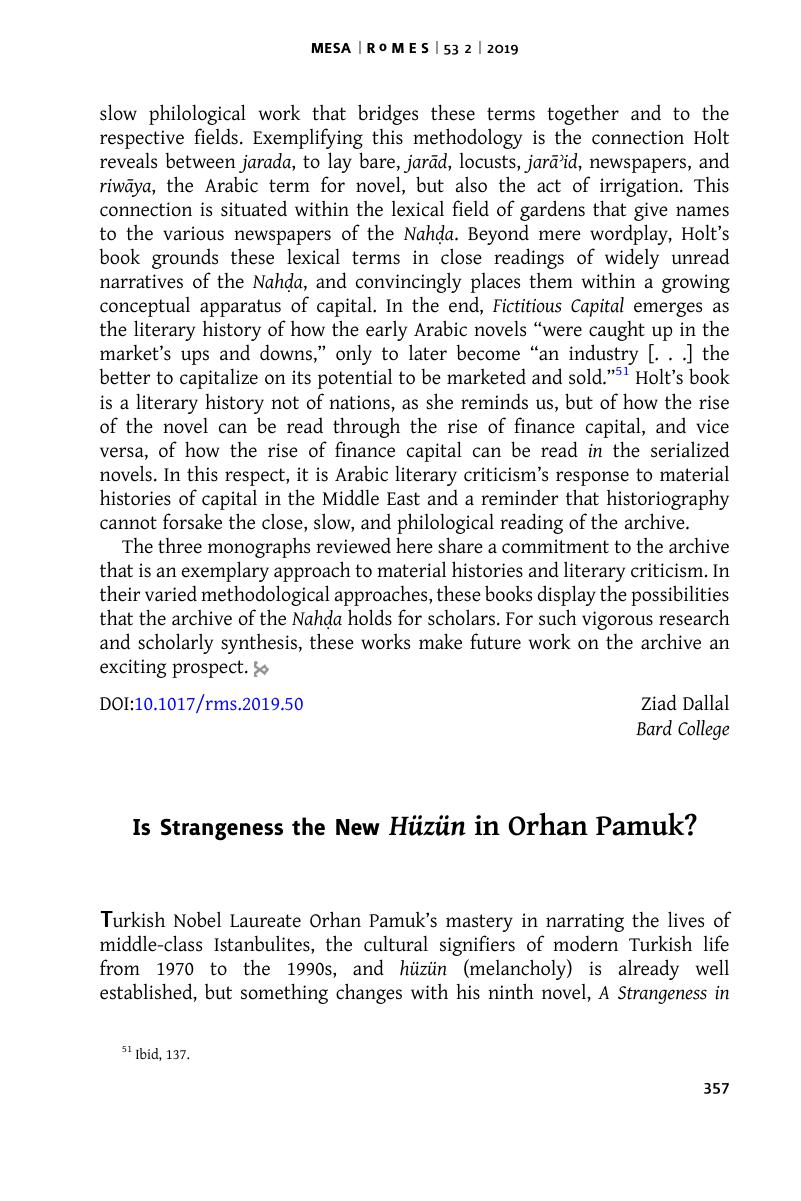No CrossRef data available.
Article contents
Is Strangeness the New Hüzün in Orhan Pamuk?
Published online by Cambridge University Press: 27 November 2019
Abstract

- Type
- Field Spotlight: Book Reviews in Literature
- Information
- Copyright
- Copyright © Middle East Studies Association of North America, Inc. 2019
References
1 See, for example, Banu Helvacioglu's “Melancholy and Huzun in Orhan Pamuk's Istanbul,” Mosaic, 46.2, 163–178., Esra Elmas's “Disoriented in Istanbul: A Reading of Its Fogscapes across the Twentieth Century,” Culture, Theory, and Critique, 57.1, 17–31 and “A Melancholy of my Own: Orhan Pamuk's Istanbul: Memories and the City,” Modern Humanities Research Association Working Papers in the Humanities, 6.1, 58–70, Konuk Kader's “Istanbul on Fire: End of Empire Melancholy in Orhan Pamuk's Istanbul,” Germanic Review, 86 (4), 249–261 and Esra Akcan's “Melancholies of Istanbul” World Literature Today, 80.6, 39–43.
2 Almond, Ian, “Islam, Melancholy, and Sad, Concrete Minarets: The Futility of Narratives in Orhan Pamuk's The Black Book” in New Literary History, 34.1 (2003), 75–90CrossRefGoogle Scholar.
3 Laschanger, Verena, “Flaneuring into the Creative Economy: Orhan Pamuk's Istanbul: Memories of a City” in Explicator, 67.2 (2009), 104Google Scholar. “If Benjamin's flaneur made the city of Paris the representative landscape of modern capitalism, Pamuk's makes the representative the city of creative economy.”
4 Almas, Esra, “Disoriented in Istanbul: A Reading of Its Fogscapes Across the Twentieth Century” in Culture, Theory and Critique, 57.1 (2016), 17–31CrossRefGoogle Scholar.
5 Akcan, Esra, “Melancholies of Istanbul,” in World Literature Today, 80.6 (2006), 39–43CrossRefGoogle Scholar.
6 Almas, Esra, “A Melancholy of my Own: Melancholy in Orhan Pamuk's Istanbul” in Culture, Theory and Critique, 57.1 (2016): 69Google Scholar.
7 Pamuk, Strangeness, 319.
8 Pamuk, Strangeness, 3.
9 “Alem” in the Turkish original (63) is translated as landscape in the English translation. On page 109, it is translated as “universe.” On page 135, it is translated as “world.”
10 Pamuk, Strangeness, 318.
11 Ibid., 336.
12 Ibid., 80.
13 Ibid., 584.


